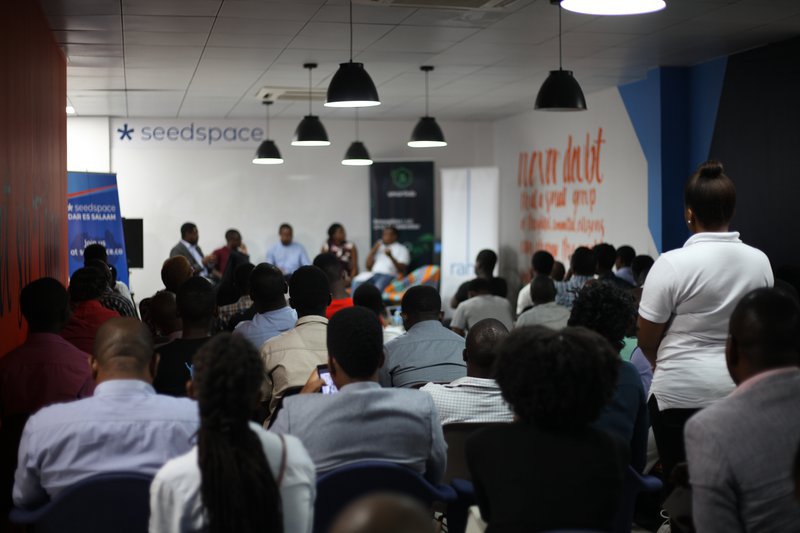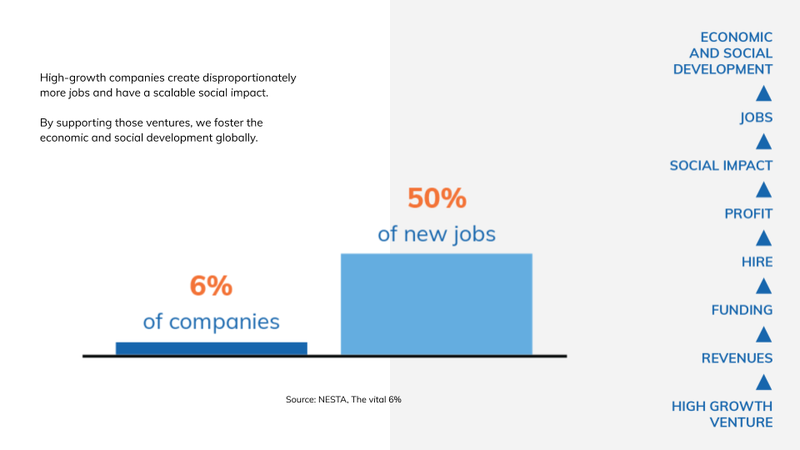
AFRICA • EDUCATION & CONSULTING
Seedstars Global
SEPTEMBER 18, 2020
When the time comes to make career choices, modern young people suddenly find themselves in a seismically active world, where rock-solid paradigms are cracking, new normals are forming, and opportunities are flowing like lava. And just like in the real world, the climate will only be getting hotter, so if the young want to enjoy stability and growth in the future, it’s best to plant the seeds now. Let’s take a look at the current situation in Africa, the world’s second-largest continent with a population of over 1.3 billion people.
62% of people living in Sub-Saharan Africa (SSA) are below age 25, making the African continent’s population one of the youngest in the world. In the same report, the UN estimates SSA to contribute 1,05 of the total 2 billion people who may be added to the world’s population by 2050. To turn this demographic wave into the perfect storm that will propel Africa forward, these young people are going to need access to education, vocational training, and opportunities.
As a report by the International Labor Organization (ILO) indicates, 17% of young people aged 18-24 have lost their jobs after the start of the COVID-19 outbreak in such areas as clerical support, food and accommodation services, sales, crafts, and related trades. Some of the common traits of those sectors are a comparatively low level of education or training necessary to perform the job, lack of digital innovation, and inability to transition to an online model. However, even companies that have managed to keep most of their workforce on payroll by moving to online now plan to keep some of their employees on remote access permanently.
According to another report by ILO, an average of 13,6% of youth is unemployed globally, while about one-fifth of the world’s young people are NEET (not in employment, education, or training). Moreover, among the 429 million who are able to secure a job, many are essentially working for peanuts: 55 million young workers are making less than $ 1,90 and 71 million - under $3,20 a day, which classifies them as suffering from extreme and moderate poverty respectively.
And yet, there is a growing demand for a whole slew of jobs, most of which only came into existence in the last ten years or so. A report, published by the World Economic Forum, lists artificial intelligence specialists, medical transcriptionists, data scientists, customer success specialists, and full-stack engineers as the highest-growth jobs of tomorrow. There is also great potential in landfill biogas generation system technicians, social media assistants, wind turbine service technicians, green marketers, and growth hackers.
To meet the demand for these varied occupations and drive digital transformation, future candidates will need strong soft skills and a solid background in digital tech, which can be achievable with proper vocational training. But can the education system in Africa prepare today’s youth for those jobs of tomorrow?

The first Technical and Vocational Education and Training (TVET) programs had been introduced in many African countries starting with the 1950s - with varying success. The involvement of the World Bank and UNESCO reinvigorated those efforts and, to a great extent, transformed the alternative to tertiary education into what it is now. Despite significant progress, the system is currently not harmonized in terms of policy, quality assurance, and center governance across the many countries of the continent, and implementation levels remain relatively low.
The switch to distance learning has already taken a toll on the students’ participation in classes and overall performance, and educators are struggling to keep up on the technical front - mastering novel online tools and trying to ensure ubiquitous access to knowledge for all students. Vocational training might be at a disadvantage, “as more efforts are put into general school subjects, and less in typical vocational content,” - states the official survey launched by the European Commission. Bogged down by the current complications, many educational institutions lack the resources to plan ahead and develop long-term strategies.
However, a country’s economy can really benefit from harnessing the full potential of TVET, and Switzerland’s success is living proof of that. The “dual” VET system the Swiss have been running for decades has proven so effective, it is often referred to as the “gold standard” of vocational education.
Young apprentices receive their training in real settings, performing duties under the supervision of certified trainers. The federal government, employer associations, and the cantons (provinces) work in unison to assist the students in every step of the way.
The highly-skilled, proud, and professionally trained workforce forged by the Swiss VET system is ready to cooperate with entrepreneurs, embrace and support innovation, which gives the economy a powerful boost. With some adjustments, this can be a real game-changer for Africa.

The multicultural and multi-ethnic diversity of Africa is only matched by the vastness and splendor of its land, so there are significant variations across regions in terms of employment and entrepreneurial tendencies.
Currently, the continent hosts six out of ten of the fastest-growing economies in the world, but the COVID-19 pandemic has hit Africa hard, and many countries were not prepared to handle the crisis. The African Development Bank Group forecasts losses of 25 to 30 million jobs by the end of 2020, should Africa’s GDP contract by 3,4%.
Foreign direct investments are also expected to take a plunge due to the uncertainties of the financial climate. Under these circumstances, supporting local entrepreneurial initiatives and helping small and medium-sized enterprises (SMEs) grow and expand is a matter of critical importance - and that is precisely what Seedstars does.
Africa experiences a proliferation of nascent entrepreneurship, with many young people choosing to develop (social) entrepreneurship ventures (predominantly in North and Sub-Saharan Africa), and others focusing on such industries as EdTech, FinTech, InsureTech, etc.
At Seedstars, we believe that entrepreneurial education and vocational training - especially in digital tech - are essential means to achieving economic and social development of entire regions in the long run. True to our own Theory of Change, we focus our efforts on providing young entrepreneurs with access to the ecosystem where they can interact with private and government entities, exchange knowledge, connect with investors, and transform their startups into fully viable and scalable businesses. This, in turn, creates jobs and leads to a positive social and economic impact on local communities.

You are welcome to check out The Seedstars Index (SSI) - a universal data-driven decision-making tool we use to assess the efficiency of an entrepreneurial ecosystem. You will find a lot of useful data and get a better idea of how we support governments, Development Finance Institutions, non-profits, and corporates to develop startup ecosystems.
The Seedstars team runs a number of online and offline programs designed to support startups at different stages of development:
Seedstars has been able to adjust to the COVID-19 reality with minimal losses by fully moving our services online. We even held our hugely successful annual Seedstars World Competition in the online format, granting all participants free access to every pitching session and discussion.

An issue young African entrepreneurs face is the scarcity of specialized educational resources and programs. Our company addressed this by setting up the Seedstars Academy in Nigeria - an online education course for young entrepreneurs targeting FinTech and insurance sectors. 30 beneficiaries have graduated from the Academy over the course of three years, having completed a 12-week study program, and two out of four ventures passed scrupulous testing to later become successful startups in the micro-lending and SME-lending sectors.
An edition of Seedstars Academy in Ivory Coast with a focus on EdTech resulted in the validation of three high-impact business models and an 80% rate of graduation for its students. One of the approved startups trains growth hackers and offers trainees job placement opportunities, filling the need for this coveted profession of the future.
Seedstars Accelerator Tanzania is another excellent example of the holistic approach we adopt. Over three months, young entrepreneurs enjoyed unlimited access to local and international mentors, attended one-on-one sessions and guided workshops. They were introduced to business and investor networks. Targeted training and assistance were also available. At the end, the best performer received an investment of $20,000 from Seedstars at the Demo Day.
Securing funds to fuel their innovation is a major pain point for new ventures. A recent report by McKinsey highlights that only 9% of SMEs sourced funding from the private sector, and a meagre 6% were able to obtain government funding in 2020. At Seedstars, we help aspiring startups pitch their projects and secure funding of up to $500,000 thanks to our network of 100,000 stakeholders in 85+ countries.

Here are some of the projects that were recently backed by Seedstars and came to fruition:
As the world becomes increasingly more digital and moves to online, emerging economies stand a good chance of bypassing legacy inefficiencies and making an economic and social quantum leap. Highly skilled young professionals and entrepreneurs can be the driving force behind those changes, and all they need to jump-start the stalling post-COVID economy is a little nudge.
If we take the time and plant the seeds now, by ensuring that online education and vocational training are widely available, providing the infrastructure and financial resources for fast-growing small businesses, we will soon be amazed at the sight of a new, flourishing Africa.
We, the team at Seedstars, are happy to be a small cog in the machine of change, and we are inviting you to join us in the process of transforming this continent’s entrepreneurial landscape.